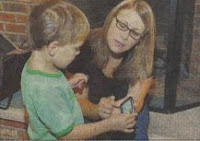Many years ago, while learning from a variety of different authors (Edward DeBono, William Glasser, and others) I was introduced to the idea that problem-solving is a most valuable skill. Whether you're the President of the United States, a stay-at-home-mom, a college student, a teenager, or just about anything else, you're faced with problems—little ones and big ones—that need to be solved on a daily basis! And perhaps people with the most effective problem-solving skills enjoy more success in their personal and/or professional lives: their ability to problem-solve leads to less conflict, more tranquility, greater self-determination, and more.
Learning to problem-solve could be considered a normal part of growing up. As children grow and mature, they're expected to figure things out for themselves and, hopefully, they learn from their mistakes. However, if children are not given opportunities to problem-solve on their own, they'll remain helpless and dependent on others.
All too often, this has become the reality for too many children with developmental disabilities. We haven't expected them to become problem-solvers, so we haven't given them opportunities to problem-solve. Thus, many grow up to become adults who are seen as helpless, dependent, and incompetent, which leads to their spending their lives in sheltered, protective, segregated environments where others make decisions and problem-solve for them. This is a terrible tragedy! But regardless of the age of the person or the type of disability, we can take steps to prevent and/or reverse this dismal and tragic state of affairs.
We can ensure that children with disabilities are given opportunities to problem-solve, just like their brothers and sisters. They may need assistive technology devices (such as communication or mobility aids), accommodations, and/or other supports/modifications in order to problem-solve, and the same is true for adults with disabilities. Children and adults with disabilities can and should be more active in the development of their IEPs (Individualized Education Programs), ISPs (Individualized Service Plans), and/or other services, including therapies and interventions.
We can stop being "helicopter helpers"—constantly hovering—and allow children and adults to make their own decisions (knowing they will make mistakes and learn from them, just as people without disabilities do). When they come to us to solve their problems, we can respond with, "What do you think you should do about that?" We can then provide suggestions, if appropriate, and let them arrive at the solution. Imagine the personal growth an individual experiences when our actions send the message that we believe in their capacity to problem-solve; imagine the lessons they'll learn; and imagine how their lives (and ours) can change in the process!
There's much more we can do; this brief review can get us started. Let's put our own problem-solving skills to work in figuring out how to ensure the people with disabilities we care about become effective, successful problem-solvers in their own lives!
Copyright 2009 Kathie Snow, www.disabilityisnatural.com; all rights reserved.
VISIT DISABILITY IS NATURAL
Check out the Explore sections for over 100 innovative, thought-provoking articles on language and attitudes, children/family issues, and more! Click here to begin exploring life-changing strategies, new ways of thinking, and more.
Visit the Store—check out the Disability is Natural book and DVD, as well as posters, magnets, bookmarks, badges, and other goodies featuring more than 25 bright, positive, colorful designs to generate positive attitudes and actions!
Click here to visit www.disabilityisnatural.com.

 Music and art can be a vehicle for exploration, expression, socialization and skill building.
Music and art can be a vehicle for exploration, expression, socialization and skill building.




 Check out this stylish alternative to shoe laces or velcro for kids who can't tie their shoes. Other great products and ideas on this website, also. $5 discount coupon is currently on the home page.
Check out this stylish alternative to shoe laces or velcro for kids who can't tie their shoes. Other great products and ideas on this website, also. $5 discount coupon is currently on the home page. 


